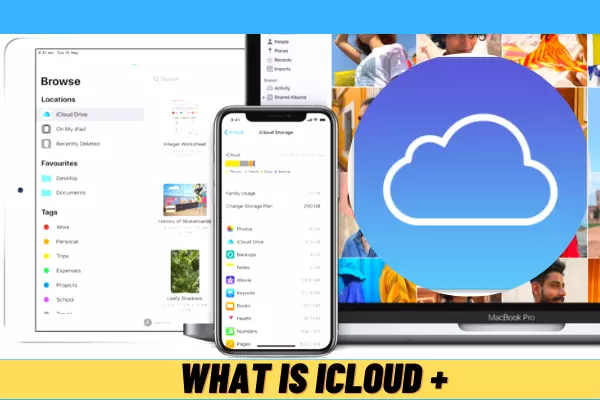What is iCloud Plus? Apple’s iCloud Plus is a newer and upgraded version of its cloud storage service named iCloud. As the name suggests, this is not a new service but actually an extension of the Apple iCloud service.
So iCloud Plus is not just an online storage service but it is much more than that. iCloud+ provides dedicated privacy features to Apple users such as Hide My Email and Private Relay.
Apple has always promoted privacy and digital security, so it has included many privacy features in its new iOS 15 version.
However, Apple is already providing its users with a cloud-based service called iCloud. And now introduced its upgraded version iCloud Plus.
What Is iCloud Plus?

Mainly, iCloud Plus is a newer and upgraded version of Apple’s cloud-based storage service called iCloud.
Previously it only offered users a digital space to store their data or files such as documents, photos, or videos. But now, Apple has included and integrated several new privacy-oriented features to make improvements.
An improved version of the online cloud storage service called iCloud that Apple already offers to its users.
According to Apple’s statement on its official website,
iCloud Plus “combines everything users love about iCloud with new premium features.”
What is included in iCloud+?
Some prime examples of its features are that user calls now use a private relay that acts as an in-house Apple VPN while surfing the Internet.
In addition, Hide My Email privacy features lets users protect their email addresses from possible spamming and Additionally, iCloud+ also supports an unlimited HomeKit cameras system.
iCloud Plus Features
1. iCloud Hide My Email
When users surf the Internet every day, they visit many websites or web portals that ask for the user’s email address. However, users are forced to share their email id at that time, but doing so can potentially put their privacy and security at risk.
So most of the users have to share their email id under compulsion at that time, but doing so can become a threat to their privacy and security.
But iCloud Plus’ integrated Hide My Email feature enables a user to generate a unique and casual email address, which can be filled in a form and forwards the messages to the user’s real email account. And good thing is that a user can create as many different email addresses as required and can delete them when not required.
2. iCloud Private Relay
While browsing the web on the Internet, your data, browsing history, and privacy may be at risk, and because it is also vulnerable to other people on the network. This works effectively when enabled, iCloud Private Relay sends and receives data through two private servers, so that it can be encrypted, and only the user can receive it.
Apple has also announced that the iCloud company itself cannot access a user’s database when the feature is enabled.
3. HomeKit Secure Video
The HomeKit Secure Video service that Apple iCloud already offers, expanding that service with more features. Users can now access an unlimited number of security cameras using the Apple Home app. iCloud Plus users can now add a HomeKit camera to their home premises without worrying about storage capacity, as iCloud Plus offers unlimited storage for HomeKit Secure Video.
The most impressive thing about the newly added feature is that it does not change the user’s iCloud storage used to store the storage data or the device.
However, these services are already provided by iCloud and are further strengthened by additional features.
What is iCloud Plus Cost
Apple has announced a new revamped iCloud+ subscription plan. Although, iCloud plus newly added features may prove to be beneficial for users because the company has decided to make it available to all of them at the previous subscription rates that are currently being charged.
Apple says that iCloud All paid users will be transferred to iCloud Plus at no extra cost. However, the user can choose from the available plans as per his requirement. The following is the pricing list of iCloud Plus. See iCloud pricing for all regions or countries.
| iCloud+ plans | Features | Price |
| 50GB | 1 HomeKit Secure Video camera | $0.99 monthly (Rs. 75) |
| 200GB | Up to 5 HomeKit Secure Video cameras | $2.99 monthly (Rs. 219) |
| 2TB | Unlimited Number of HomeKit Secure Video cameras | $9.99 monthly (Rs. 749) |
How Do I Sign Up For iCloud+?
Apple announced that its existing iCloud customers will automatically be upgraded to iCloud+ this fall. If users are already on a paid iCloud subscription or account in an Apple One bundle, no action will be required.
Whenever you need to, you can create a new iCloud account for yourself on any iPhone, iPad, or Mac device during setup with your Apple ID. But if you don’t have an iCloud account then you can easily create a new Apple ID on your Mac, iPhone, or iPod device to use iCloud.
FAQ
How much will iCloud plus cost?
According to the company’s official statements, the arrival of Apple iCloud Plus will not increase the cost of storage plans. There has been no change in the subscription plans, storage, and cost already fixed for iCloud services. This means that there will be no change in storage or prices after upgrading to iCloud+.
iCloud Plus Cost Per Month: 50GB – $0.99, 200GB – $2.99, 2TB – $9.99. (Price for the U.S)
Bottom Line
This year at WWDC 2021, Apple announced the addition of new features to its iCloud service and rebranded it as iCloud+. In this article, we reviewed what is iCloud Plus and how is it different from iCloud service.
iCloud+ introduces a number of new features, some of them being the privacy-focused Hide My Email and Private Relay, and enhanced HomeKit secure video storage as well. It also turns out that iCloud + in Apple’s iOS 15 previews will come with custom email domains for iCloud Mail accounts.
Basically, iCloud is not a new service as it is already providing its services to the users. But Apple integrated some advanced and pro features and renamed it to iCloud Plus.

![How to Get Google Cloud Credits For Startups [Free] 2023 7 Google Cloud Credits For Startups](https://mywebshosting.com/wp-content/uploads/2021/04/google-cloud-credits-for-startups-1024x536.jpg)


